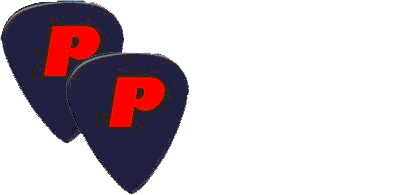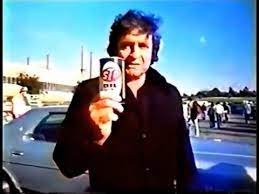Writing With Johnny Cash
In hindsight, I can see where being able say you wrote a song with Johnny Cash, even if it was for STP motor oil and additives, would look cool on your resume, if not on your tombstone. But it is interesting that it did take hindsight plus the prodding of friends before I did see it, which is a good thing, because if I’d seen it that way when it went down, I might have panicked and maybe choked. Here was the situation, at least as I remember it.
The advertising agency I worked for as Music Director from 1977 to 1981, J. Walter Thompson, had pitched and won the STP account away from another agency, Dancer Fitzgerald Sample (I think, but I’m not sure), with a proposed campaign that would center on Johnny Cash as the company’s presenter, as it called in the ad business. The agreement between Johnny, STP and the agency was elaborate. It included a huge print and billboard campaign featuring Johnny’s likeness in every ad, a specified number of public/personal appearances, a package of TV and radio spots and more, all spaced out over a year.
It also was to include his performance of “I Walk the Line,” with parody lyrics for STP. For the four people who don’t know this song, “I Walk the Line” was a huge hit, an iconic chunk of musical Americana, Country and Crossover, recorded in 1956 and still raptly listened to today.
But something happened on the way to the recording studio: STP was called on the carpet, big time, by the Federal Trade Commission for flagrantly false advertising for several of their products, especially their additive, STP Engine Treatment, their flagship product. When I say “big time” I mean they had to take out full-page mea culpa ads in magazines like Time, Newsweek, Car & Driver, Fortune, Business Week and most widely read newspapers across the Country.
Now, dedicated car drivers, especially those who worked on their own cars, and super-especially guys who lived in the South and rural areas, were hugely important to Johnny and his business machine, and they were irate. Johnny wanted out, and he had a clause in his contract that would allow him to, but he said he’d have to think a spell about it. One thing he did know, though: he would no longer sing “I Walk the Line” with parody lyrics. You can understand that. It was sort of his love/cowboy/road song, his personal anthem and he didn’t need to pollute it with bogus engine additive.
He finally did agree to do the project (NB: he was having bad tax problems at the time), minus the song. Company and Agency breathed a huge sigh of relief and accepted losing the song as a bearable cost. Except for one person, the agency ACD (Associate Creative Director) whose baby the whole campaign had been from presentation to execution. His name was Tom Mabley, a tall, blond, bright, hard-drinking-and-working Indianan who’d grown up listening to Cash and wasn’t ready to let the song go entirely without a fight. He knew Johnny wouldn’t relent on “Walk the Line” per se, but he wanted to see how close we could get to knocking it off without Johnny balking.
Tom and I had gotten drunk and talked Country at the Meeting, the Agency barroom, often. We’d tentatively agreed the greatest names in Country Music were Jimmy Rogers, Mother Maybelle Carter and Johnny Cash, so I knew what it meant to him to have Johnny do a song, and “not some fucking New York Jew jingle,” as he put it (Tom knew I was Jewish, and I knew he was a goyisher kopf).
He also knew I’d been in the Graduate Folklore and Folk Music Program at UCLA, and that I’d co-produced a limited-issue album (vinyl, of course. It was 1964) of never-before-heard Carter Family broadcasts from the 1930’s out of XERB in El Paso, Texas. In other words, I might have something Mother Maybelle, inventor of the Carter Family stroke, the basic strum of all Country music, and very alive and kicking, might enjoy. That turned out to be an understatement.
The Johnny Cash-Carter Family tie-in was Johnny’s 1968 marriage to June Carter, Mother Maybelle’s oldest daughter. He was welcomed into the Family and became devoted to Mother Maybelle.
Tom was as frantic as I’d ever seen him. He ordered me to go back to an ex-girlfriend’s house where I’d left the album and retrieve it, in the middle of the monumental 1968 New York storm. She refused to let me have it. I parked down the street and waited, with the snow building up by the hour around the rented car. I’d get out every once in awhile and brush it away with my hands. Eventually, she left for work. I clambered my way onto the roof, crotch deep in snow, pried open a window I knew was pryable, grabbed the album, slipped off the roof (thank God for the heavy snow) and ran.
By that night I was in Johnny Cash’s Nashville mansion, mouth dry, Gibson J-45 in its open case staring at me from the floor. His was on his knee.
“You know, Art─that’s not right,” he said. “What’d you say your name was? Oh yeah, Al─you know, Al, I’m still not delighted with the turn of events.”
“I don’t blame you, Mister Cash,” I said.
“I don’t want to sound pretentious, Al, but there’s a lot of boys out there feel pretty foolish about puttin’ STP in their cars thinkin’ it was doin’ something good and finding out it wasn’t.”
“Yessir, Mister Cash.” I know my Adams Apple throbbed, because I could feel it.
He pursed his lips, his eyes went up, and I was sure he was thinking about bailing after all, so as not to piss those boys off any more than they were. Contractually, he certainly had the right.
“You do know I’m not doing the song, don’t you? he said, looking directly into my eyes.
“Yessir, I do. I think that’s why they sent me down, Mister Cash,” I said.
“That’s what I thought. Listen, Al, it’s not gonna happen. No how, no way.”
“Yessir,” I said, trying to meet his driving, piercing gaze, “but if you don’t mind, Mister Cash, I have a hunch that Tom─you know, my boss?─agrees with and thinks maybe you might, too.”
“Well,” he said, propping his guitar against an ottoman, “I’d be surprised, but go ahead on.”
I took my guitar out of its case, put it on my knee, and that’s when it hit me what was going on here: I was about to try to play guitar in front of the reigning King of Country Music, and it was his music I was going to try to play. I felt like an idiot. Now I wanted to bail, too. But I remembered a phrase I’d learned years before from Doc Watson: The fat’s in the fire, now.
“Well, Mister Cash,” I said, making a C-chord, “I’m thinking that it may be your basic sound that most reminds the client of you. Like this,” I said. I damped the bottom two or three strings with the heel of my right hand, breathed in, and started to play the two lowest strings, alternating between the C and G with a flatpick and trying hard to get that thwacking, bouncing sound he and his band had just about patented.
“Bump buh-buh, bump buh-buh, bump buh-buh, bump buh-buh,” thwacking back and forth between the A and E strings trying really hard to get as close to his sound as I could.
“Bump bubba, bump bubba, bump bubba, bump bubba,” I played, staring intensely at my left, then my right hand, anything to avoid meeting his eyes until I’d finished trying to make my point.
But when I did finish, I looked up and found him smiling broadly and warmly at me, and starting to reach for his own guitar.
“Al, you’re from New York, aren’t you?” He said, pulling his pick from where it was wedged between three strings.
“Not really, Mister Cash, I’m actually─”
“Call me Johnny, Al,” he said, in that barrel-chested, open, nasally bass of his, the first time I’d heard it that way that night.
“Yes sir.”
“Johnny,” he said, smiling hugely again.
“Johnny,” I said.
“You must have listened to some my songs, then.” It wasn’t a question.
“Yes, um, Johnny,” I said, “ever since “‘I Walk the Line.'”
“Uh huh,” he said, his face suddenly becoming grave.
“And I’ve been thinking about that, too…a little…also… Johnny.”
“Uh huh.”
“Okay. So what I’m wondering is that the chord progression at the start of “I Walk the Line, from G to C,” I said, playing the first few bars of the song, “may be a big part of what you want to avoid if we were trying to get that sound…without getting that sound, if you know I mean.” I had thought this through long before our meeting, at least the presenting of it, and now I knew I’d have to just wait for him to go one way or the other.
“Show me what you mean, son,” he said starting to put his guitar down again. I didn’t want that.
“Well, why don’t we play in C for awhile and maybe we can find a way to get close to your song without getting too close.”
So we started picking. I refused to reflect on that right then. I didn’t need to throw up. Johnny himself never played the thwacking bump bubba, bump bubba, his electric rhythm guitarist always did that, but he chorded with his thumb pick, and while he did I led us from the C to an a-minor, then back to the C again, back and forth between the C and a-minor, until we had a groove.
He smiled, and seemed to relax a little. “You may just have something going there, Brother Al. I like the way you’re leadin’ from one chord to the other. What were those STP lyrics, again?”
“Uh, ‘There’s a kind of man that’s mighty proud,'” I said, trying to put a voice to Tom’s prose.
“Right,” he said, “now we just need to find a melody.”
“I can’t believe we won’t,” I said.
“Me neither,” he said.
One-liner Notes:
“Too bad ‘Blind Al’ is already taken.” Guitarist Bobby Arlen of The Leaves to Evergreen Blueshoes’ and Byrds’ bassist Ship Battin when Skip’s partner, Al Rosenberg, walked into a plate glass slider at a gig. At the time, “Blind Al” was the nickname for Al Wilson, the late singer/player with Canned Heat.

